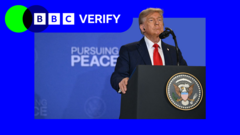How Many Wars Did Trump Actually End?

In recent statements, former U.S. President Donald Trump has claimed credit for ending multiple conflicts and described himself as a "peacemaker-in-chief." He cites numerous negotiations during his administration, particularly highlighting a supposed ability to broker peace without formally declaring ceasefires. However, the realities of these conflicts and the sustainability of any agreements often paint a more complicated picture.
Last updated: 02 October 2023 (BST)
Key Takeaways
- Trump has claimed to have ended seven wars during his presidency.
- Some conflicts lasted only days and lack lasting agreements.
- Critics argue many claims are overstated or lack formal ceasefire agreements.
- International leaders have both credited and downplayed U.S. involvement in peace efforts.
- The situation remains fluid, with tensions persisting in several regions.
Trump's Claims of Conflict Resolution
On 18 August, Trump spoke at the White House, asserting that he had ended six wars, a figure that later increased to seven. He stated, "I've ended six wars… all of these deals I made without even the mention of the word 'ceasefire'." This bold assertion has raised eyebrows among political analysts and international observers.
While the Trump administration has put forth a case for a Nobel Peace Prize, the conflicts cited often reflect a history of long-standing tensions rather than definitive resolutions. It's important to scrutinise Trump's claims to understand the actual outcomes of these negotiations.
Israel and Iran: A Complex Relationship
The conflict between Israel and Iran has been historically fraught, marked by military actions and political tensions. The most recent flare-up began with Israeli airstrikes on Iranian targets on 13 June. Following twelve days of hostilities, Trump announced a ceasefire, crediting his administration for mediating the outcome. However, Iran's Supreme Leader Ali Khamenei declared a "decisive victory" without acknowledging a ceasefire.
According to Michael O'Hanlon, a senior fellow at the Brookings Institution, while the weakening of Iran by Israel, with U.S. support, is strategically significant, the situation can only be described as a de facto ceasefire rather than a formal end to hostilities. O'Hanlon suggests that more needs to be done to ensure lasting peace, particularly regarding Iran's nuclear programme.
India and Pakistan: A Fragile Peace
Relations between India and Pakistan have been rocky for decades, with recent tensions escalating dramatically in May due to military engagements in Kashmir. Trump claimed to have mediated a "FULL AND IMMEDIATE CEASEFIRE" after four days of conflict, with both nations acknowledging U.S. involvement. However, the Indian government downplayed Trump's role, asserting that talks occurred through established military channels between the two countries.
This example illustrates the complexities of diplomatic negotiations, where one party may claim success while the other attributes outcomes to its own efforts. A Nobel Peace Prize recommendation from Pakistan highlights the differing perspectives on U.S. engagement.
DR Congo and Rwanda: Ongoing Hostilities
The peace agreement signed between the Democratic Republic of Congo (DRC) and Rwanda in June was another of Trump's touted successes. The agreement aimed to address decades of conflict, but both parties have since accused each other of ceasefire violations. Margaret MacMillan, a history professor, points out that fighting has continued, suggesting that the ceasefire has not been effective.
The involvement of external mediators, such as the U.S., can sometimes lead to short-term agreements but may fail to address underlying issues, resulting in a return to hostilities.
Thailand and Cambodia: A Rapid Resolution
In July, Trump intervened in a conflict between Thailand and Cambodia, which lasted just over a week. His administration threatened to halt tariff negotiations unless both nations reached an "immediate and unconditional ceasefire." This pressure resulted in an agreement, with both parties crediting Trump's involvement. Analysts suggest that while the Oval Office’s involvement may have accelerated the peace process, the underlying tensions remain unresolved.
Other Conflicts: Mixed Results
Trump's claims extend to various other regions, including the longstanding dispute between Serbia and Kosovo, as well as tensions over the Grand Ethiopian Renaissance Dam. In these cases, Trump suggested that he had prevented potential conflicts from escalating into war. However, experts argue that the actual situations were not active wars but rather ongoing disputes.
As such, the narrative surrounding Trump's peace efforts often lacks nuance and overlooks the complexities of international diplomacy. The absence of formal agreements in many cases raises questions about the sustainability of the purported successes.
The Importance of Sustainable Peace
While it is undeniable that some of Trump's actions may have led to temporary resolutions, the essential question remains: can these agreements lead to lasting peace? The answer is often complicated by factors such as historical grievances, economic interests, and regional power dynamics.
Experts advocate for a more comprehensive approach to conflict resolution, emphasizing the importance of diplomatic engagement that addresses root causes rather than merely facilitating short-term ceasefires. Without this, the situation may remain precarious, with potential for renewed conflict.
Conclusion: What Comes Next?
As Trump continues to highlight his diplomatic achievements, it is crucial for observers to differentiate between claims of peace and the reality of ongoing tensions. The world of international relations is complex, and the simplistic portrayal of "ending wars" often belies deeper issues that require sustained effort and engagement.
As nations navigate these challenges, the lessons learned from Trump's claims and the realities on the ground will be vital in shaping future diplomatic efforts. How will these countries move forward, and what role will the U.S. play in facilitating genuine peace? The next steps remain uncertain, but the importance of credible diplomacy cannot be overstated.
FAQs
What wars did Trump claim to end?
Trump has claimed to end conflicts involving Israel and Iran, India and Pakistan, the Democratic Republic of Congo and Rwanda, and Thailand and Cambodia, among others. However, the validity of these claims is debated.
How does Trump define a war he has ended?
Trump often refers to conflicts that were either brief or had historical underpinnings, suggesting he has mediated ceasefires without formal agreements. This raises questions about the sustainability of these peace efforts.
What is the significance of ceasefires in international conflicts?
Ceasefires can provide temporary relief and create conditions for negotiations, but without addressing underlying issues, they may only delay further hostilities. Sustainable peace requires comprehensive solutions.
Are Trump's peace efforts recognised internationally?
While some leaders have credited Trump for his involvement in specific negotiations, others have downplayed U.S. influence, emphasising direct communication between the conflicting parties.
What challenges do mediators face in conflict resolution?
Mediators often encounter deep-rooted grievances, power imbalances, and divergent interests, making it challenging to achieve lasting agreements. Effective diplomacy requires patience and a nuanced understanding of the issues.
Published: 2025-08-20 01:21:31 | Category: technology



